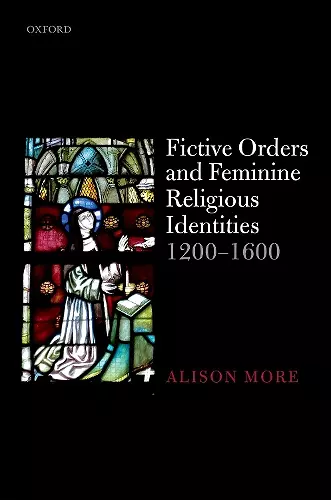Fictive Orders and Feminine Religious Identities, 1200-1600
Format:Hardback
Publisher:Oxford University Press
Published:8th Mar '18
Currently unavailable, and unfortunately no date known when it will be back

Any visitor to Belgium or the Netherlands is immediately struck by the number of convents and beguinages (begijnhoven) in both major cities and small towns. Their number and location in urban centres suggests that the women who inhabited them once held a prominent role. Despite leaving a visible mark on cities in Europe, much of the story of these women - known variously as beguines, tertiaries, klopjes, recluses, and anchoresses - remains to be told. Instead of aspiring to live as traditional religious, they transcended normative assumptions about religion and gender and had a very real impact on their religious and secular worlds. The sources for their tale are often fragmentary and difficult to interpret. However, careful scrutiny allows their voices to be heard. Drawing on an array of sources including religious rules, sermons, hagiographic vitae, and rapiaria, Fictive Orders and Feminine Religious Identities traces the story of pious laywomen between the thirteenth and sixteenth centuries. It both emphasizes the innovative roles of women who transcended established forms of institutional religious life and reveals the ways in which historiographical habits have obscured the dynamic and fluid nature of their histories. By highlighting the development of irregular and extraregular communities and tracing the threads of monasticisation that wove their way around pious laywomen, this book draws attention to the vibrant and dynamic culture of feminine lay piety that persisted from the later middle ages onwards.
...the book's central thesis is of compelling interest. * Walter Simons, Early Modern Women *
...deeply researched book... * Bruce L. Venarde, Church History *
Fictive Orders and Feminine Religious Identities offers a much-welcome analysis of the representation of women religious in the late medieval period. More brings a valuable contribution to the vibrant scholarship on active womenreligious in late medieval and early modern Europe. * Liise Lehtsalu, European History Quarterly *
More's book is an important contribution to the history of medieval women's religious communities that brings together a wealth of new scholarship on lay female piety...Dispelling the myth of order unity and probing the thorny problem of nomenclature, More reminds us that medieval women's lives were much more active and dynamic than labels, claimed affiliations, rules and narratives suggest. * T. Stabler Miller, Loyola University Chicago, English Historical Review *
In demonstrating so convincingly that identity and vocation is irreducible to order affiliation and the ways in which processes of regularisation were used by male ecclesiasts to suppress the provocative imaginative worlds of extra-regular women, More has written one of the most important books on medieval women's religious devotion in the field. I hope that it pushes historians of these women who are not already doing so to rethink radically how we write their histories, and to refuse to replicate narratives that participate in their silencing. * Kirsty Day, University of Edinburgh *
The book is...a valuable reminder to historians to think about whose lenses we employ when looking at the past, and whose metrics we use when we consider issues of identity and importance...Fictive Orders is on the whole a welcome contribution to the field. It will be particularly useful to scholars of medieval women's religious history, for its careful reading and contextualisation of a multiplicity of sources, and for its insistence in dealing with women on their own terms. However, it will also be appreciated by a more general audience of scholars, who are interested in the complex ways in which identities are created by, negotiated, and indeed imposed on, women. * Yvonne Seale, State University of New York (SUNY), Women's History Review *
[Fictive Orders] will be useful to scholars interested in medieval religious women, gendered identities and historiography. The study is well supplied with the most updated literature in the field which makes it an excellent bibliographical resource for the non-specialist interested in the history of medieval lay women and religion. * Lidia Negoi, Sehepunkte *
ISBN: 9780198807698
Dimensions: 242mm x 164mm x 25mm
Weight: 488g
216 pages